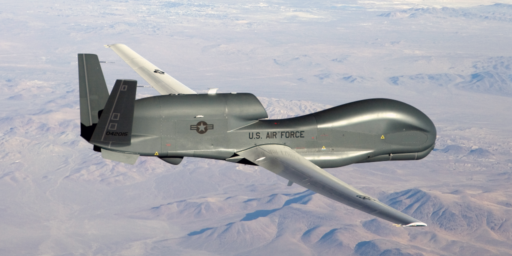Thought Problem on Iraq
Inspired by Pat Lang, I’d like to propose a thought problem. A hypothetical.
Despite the post hoc mandate we received from the United Nations Security Council and the status of forces arrangement we’ve arrived at with the Iraqi government, the U. S. continues to be the “occupying power” in Iraq in the eyes of many. Under international agreements to which we are a party as occupying power we would be responsible for protecting Iraqi airspace.
There have also been some reports that the Israelis asked then-President Bush for overflight clearance for an attack on Natanz in Iran, which was refused.
In the event of an overflight of Iraqi airspace by the Israeli air force would the United States move to prevent it? Should we?
Remember this is a hypothetical. I don’t support an attack by the Israelis on Iran nor do I know whether the reported request ever took place.
I also note in passing that the presence of a substantial military capability on the part of the U. S. in the Middle East gives us the ability to take such actions. I don’t advance that as an argument in favor of maintaining that capability and I don’t want this post to degenerate into a discussion of that but it’s something to keep in mind.






Well, we let Turkey into Iraqi airspace to go after the PKK. It seems like the Iraqi government went through the motions of protesting the action. However, most Iraqis were probably indifferent to the action.
Of course, that would not be the case if we were to allow the Israelis to overfly. We probably have concerns over re-ignition of Shia insurgency.
Because of that, one would think that there’s a lot being offered to dissuade the Israelis from doing that.
However, if there planes were to “up and go”, I would find it extremely unlikely that we would do anything to stop it. Somehow, I don’t see us shooting down Israeli planes.
When you say “prevent it,” I am assuming you mean the use of force or threat or force. Or there any other means of preventing it?
If it’s the use or threat of force, I think not. I don’t think you use violence as a means of protecting abstract notions of sovereignty without significant additional complications. Instead, you protest or take other symbolic actions that would not prevent it, but discourage further violations.
Two good points; the Iraqi’s would probably tolerate Turkish actions more than anything that takes place from Israel.
But on the other hand, you would have to think all the Iraqi’s would look at Iran as being a growing and more menacing actual physical threat than Israel.
I can see the Iraqi’s having diplomatic relations with Iraqi while being more fearful of Iraqi than Israel.
Well let’s really think hard, now: If the Israeli’s overfly a predominantly Shia Muslim country on their way to attack a predominantly Shia Muslim country, possibly with nuclear weapons, and we do nothing to stop them, doesn’t that make us implicit co-belligerents with Israel? If so, do we really want to abdicate our Go To War decision to ANY other country? As difficult as it might be to do, we lose control of a potentially NUCLEAR scenario under those circumstances. So I say, if we say no to them, WE ENFORCE IT TO THE HILT. Otherwise we might as well join them in the attack and make it REALLY COUNT, and put at risk everything we have worked for for 6 years in Iraq. That is why denying the Iranians the bomb in the first place is so much better than dealing with them when they have it. It becomes a vastly more complex and dangerous a situation.
I don’t think the US should be shooting down Israeli planes flying to bomb Iran.
I do think the Israeli’s flying over Iraq would be a potential PR disaster for the US, and I would imagine they would do tons and tons of arm twisting behind closed doors to get them to not make the flights anyway.
I would hope the behind-the-door arm twisting would include promises to end some or all the foreign aid goodies we send to Israel.
I would fear Israeli action in the same vein as The Liberty Incident to cover such an overflight.
Certainly. I think we’d be successful in this regard, since an air strike large enough to take out the entire Iranian nuclear infrastructure (which would involve things like in-air refueling over Iraq and the like) would take a great deal of planning and preparation on the Israelis’ part, which we’d notice and then (hopefully) make very angry noises about.
Of course, I could be wrong. We did little when Israel hit the Osirak Plant back in the 1980s. I just figured we’d have more time to block this particular attack, since it would be larger and more complicated.
I think it is a false question. If I remember correctly, the last Israeli bombing of Iran flew over Saudi Arabia and then across the gulf. Why fly over Iraq?
But assuming there is a good reason to fly over Iraq, the US is in a no win situation. If the Israelis are clever and sneak past the US, no one will believe the US didn’t “let them”. If the US blocks the flight, that will happen in one of two ways. Either the threat of force and Israel backs down or the use of force shooting down Israeli planes. The threat will initially be kept quiet, but eventually leak. This will give Iran both notice and world sympathy, leaving Israel in worse shape. Using force won’t endear us and will damage our relationship with Israel.
Bottom line, expect Israel to fly over Saudi Arabia if they hit Iran. The fact that the US will likely see them and say nothing is a separate issue.